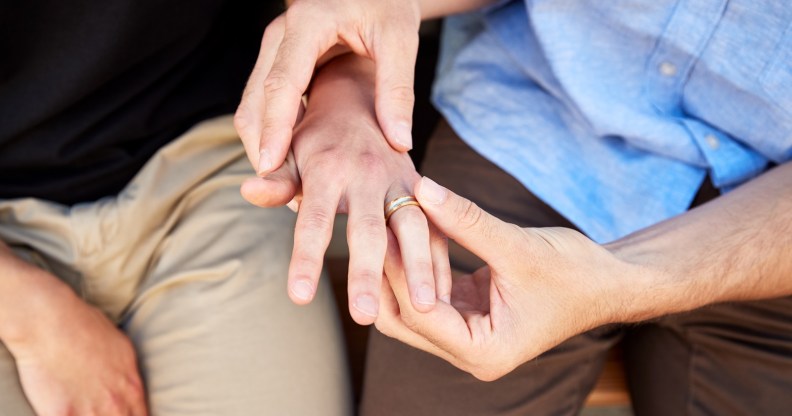Northern Ireland’s pro-LGBT church leaders want the right to marry gay couples too

Churches in Northern Ireland are seeking the right to marry gay couples
Pro-LGBT+ churches in Northern Ireland have called for the right to marry same-sex couples to be extended to them.
Civil weddings between people of the same sex are now legal in Northern Ireland, with the first set to take place on Valentine’s Day.
However, the initial bare-bones regulations extended to the region by the UK government did not include the right for religious bodies to conduct gay weddings, as they can in England, Wales, Scotland and the Republic of Ireland.
A public consultation on same-sex religious marriage in Northern Ireland was launched by the UK government on Monday to address the gap.
Churches in Northern Ireland ‘denied legal right’ to marry gay couples.
While the major religious denominations in Northern Ireland oppose same-sex unions, smaller church groups that affirm LGBT+ people are seeking equality.
The reverend Chris Hudson, the minister of All Souls Church, Belfast, said that churches in Northern Ireland should have the same freedom to either offer or decline to offer gay weddings as exists in other parts of the UK.
He said: “There should be legally-protected freedom of religion for those churches who want to offer weddings to same-sex couples, as well as to those who do not wish to provide this service to their LGBT+ believers.
“However, currently in Northern Ireland, that is a legal right which is currently denied to churches, ministers like me and same-sex couples of faith, who want to conduct their wedding in a religious setting.
“The government must address this clear inequality without further delay.”

A Pride service at All Souls Church in Belfast, Northern Ireland (Photo: All Souls Church)
Patrick Corrigan, Northern Ireland director of Amnesty International, said: “Freedom of religion is an important human right. The law should protect it for all churches and people of faith, whether they support or oppose same-sex marriage.
“Freedom to practise one’s own religion must also mean mean allowing others the right to practise theirs.
“If a church wishes to offer weddings to same-sex couples of faith, then the law should not get in the way. Equally, those churches which do not wish to offer such weddings should face no compulsion to do so – that should simply be a matter for internal debate and decision within the particular faith.”
UK government consults on religious weddings.
The UK government’s Northern Ireland secretary, Julian Smith, said: “We now want to ensure that religious bodies are able to choose whether or not to offer same-sex religious marriage, and do not unlawfully discriminate if they refuse to solemnise marriages because of the sex or sexual orientation of the couple. Such protections are already in place in the rest of the UK.
“Consulting on these issues will enable us to understand better the particular needs and concerns of the people of Northern Ireland and tailor the regulations accordingly. We will bring forward these regulations as soon as possible in 2020.”
The consultation – which is seeking submissions from same-sex couples, religious groups, LGBT+ groups and members of the public – is open until 23 February.
The proposals make clear that officiants “will only be able to solemnise same-sex religious marriage if the governing authority of the religious body they belong to has given its written consent to same-sex marriage” and that religious bodies “cannot be compelled by any means to perform same-sex marriages or otherwise be involved in same-sex marriages”.
The consultation makes clear that the provision allowing religious bodies to opt out of gay weddings “will not apply to service providers that are not religious bodies, such as hoteliers, wedding photographers and florists”.
It adds: “This is in line with wider equality law in Northern Ireland and the rest of the United Kingdom, which requires that service providers do not discriminate on grounds of sex or sexual orientation.”

